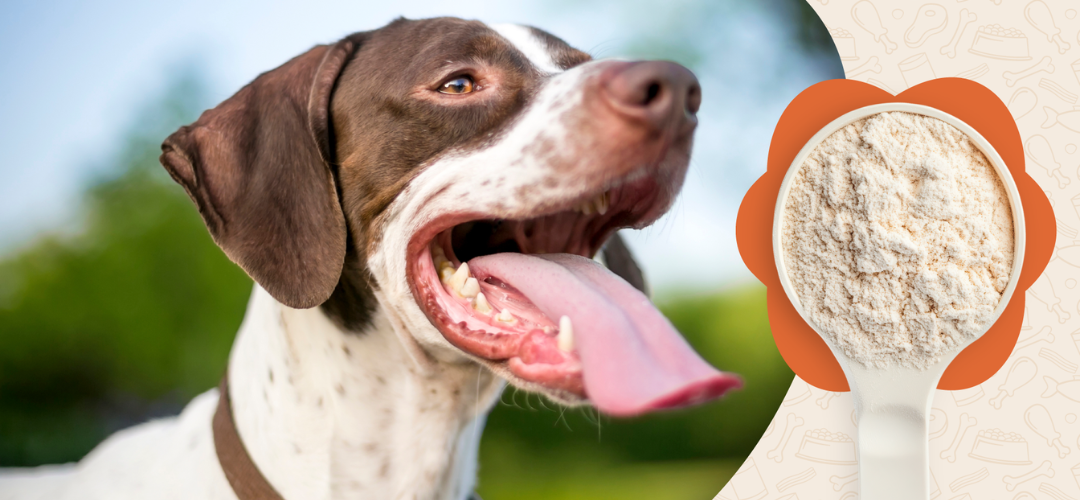
Why I Stopped Giving My Dog Multivitamins (What I Give Instead)
Share
I used to think multivitamins were just part of being a responsible dog owner, like brushing teeth or yearly vet visits.
So, every morning, I gave Tucker, my Labrador, one of those daily health chews.
Then the issues started.
He was scratching constantly. Chewing his paws raw. His belly turned red and his stool got loose. We changed his food around but nothing helped.
Eventually, the vet asked, “Is he on any supplements?”
That’s when I flipped over the label on his multivitamin and saw all the gross, synthetic ingredients it contained.
Your “Healthy” Chews Could Be Lying to You
The ingredients read like something you'd never willingly feed your dog:
- Cellulose: basically wood pulp.
- Sorbitol: a sweetener that ferments in the gut and causes bloating.
- Synthetic Vitamins: cheap forms missing natural cofactors, poorly absorbed by the body.
- “Natural Flavor”: a vague term, often masking an allergenic chemical cocktail…
Most dog multivitamins are made with low-quality synthetics. They're processed at high heat, destroying the nutrients they claim to offer, and held together with binders, fillers, and preservatives.
Unlike human supplements, pet supplements don’t require FDA approval or rigorous testing.
A recent consumer report found over 40% of popular dog supplements contain significantly less nutrients than advertised, and often contaminants or synthetic fillers instead.
In fact, according to a study published in the Journal of Animal Physiology and Animal Nutrition, synthetic vitamins have significantly lower bioavailability than their natural counterparts.
Researchers stated clearly: “Natural vitamins demonstrate substantially higher absorption rates, making them far more beneficial for canine health” (Traber & Stevens, 2011).
Another study from Veterinary Clinics of North America warns: "Long-term use of synthetic ingredients in pet foods and supplements can disrupt gut microbiota, triggering chronic inflammation and digestive issues" (Handl et al., 2011).
That’s not the wellness we’re after… that’s just deceptive marketing.
I Took Matters Into My Own Hands
I created Ancient Paws to fill this void in the dog nutrition industry.
Dr. Donna Raditic, DVM, DACVN, says it best:
“The goal of canine nutrition should be to nourish the body with bioavailable nutrients - not simply meet minimum standards.”
That became my mission with Ancient Paws.
No cutting corners - just real, whole food nutrition that I am proud to stand behind.
Ancient Paws isn’t just a chew or a treat. It’s a scoop of real superfoods that have been gently dried to maximize preserving their natural benefits.
You just scoop it, mix it into your dog’s food, and you’re done. It's just like adding superfood greens to your morning smoothie or yogurt. Except now it's your pet who is maximizing their health and nutrition! They deserve to be their happiest too, right?
Our topper seamlessly blends into any wet or dry food and delivers gut-supporting nutrition with every bite.
No synthetics, no stabilizers, or high-heat processing.
Just clean, honest ingredients that I’m confident and comfortable to give Tucker every day.
What I Noticed After Switching
Tucker’s digestion improved. His stool firmed up, coat got shinier, and he had way more zoomies throughout the day. It didn’t feel like I was managing symptoms anymore. Rather, I felt a wave of relief knowing that I was legitimately rebuilding his gut microbiome.
If You’re Giving Your Dog a Multivitamin…
Take a look at the label and ask yourself, would you feed those ingredients to someone you love? In most cases, the answer is a resounding “no.”
Your dog depends on you to choose what goes in their bowl. They deserve real nutrition, not fillers and synthetics.
We guarantee real food ingredients, real results, and peace of mind knowing that it’s something you can feel good about for your best friend.
With care and gratitude,
Stacey
Co-Founder, Ancient Paws






